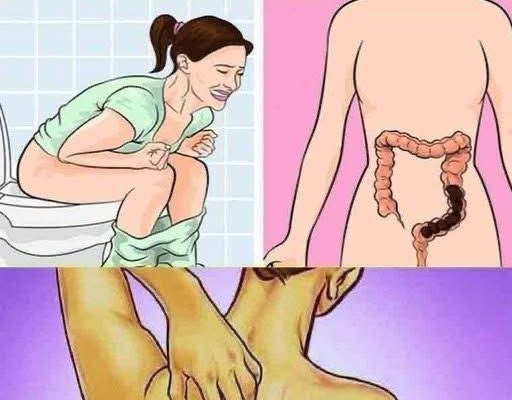Your Body Knows First: 20 Subtle Signs That Could Point to Cancer
Before turning to lab tests or scans, remember that your body often sends out its own early warning signals. It’s a powerful, natural detection system—if you know how to listen. Paying close attention to small, persistent changes can help you catch serious illnesses like cancer before they progress. Early detection can make all the difference. So if you notice any of the following symptoms, don’t ignore them—talk to your doctor and find out if further testing is needed.
“Subtle Clues You Shouldn’t Ignore”

PauseUnmuteFullscreen

Not All Cancer Symptoms Are Obvious—Here’s What to Watch For
Cancer doesn’t always announce itself with a clear warning. In many cases, the signs are indirect—subtle changes that stem from the body’s reaction to the disease rather than the tumor itself. These symptoms might mimic everyday issues or other health conditions, making them easy to miss. But recognizing these quiet signals early can be life-saving. Understanding the less obvious ways cancer may show up gives you the power to act sooner—and that can make all the difference.
1. Unexplained Wheezing or Shortness of Breath

If you find yourself gasping for air during routine activities or notice a persistent wheeze, don’t brush it off. These symptoms can be linked to lung cancer or tumors pressing on airways. While they may also indicate less serious conditions like asthma, persistent breathing issues deserve a closer look—especially if they’re new or worsening.
2. Frequent Fevers or Recurring Infections

If you’re constantly coming down with fevers or battling infections that don’t seem to go away, your immune system might be sounding the alarm. Certain cancers, like leukemia or lymphoma, can weaken your body’s ability to fight off germs—leading to repeated bouts of illness. If this becomes a pattern, it’s time to talk to your doctor.
3. Persistent Difficulty Swallowing

Struggling to swallow food or liquids—especially if it worsens over time—could be more than just acid reflux or a sore throat. This symptom is sometimes linked to cancers of the esophagus, throat, or even the stomach. If swallowing becomes painful or feels like food is getting stuck, don’t ignore it—get it checked out.
4. Ongoing Weakness and Fatigue

Everyone feels tired now and then—but cancer-related fatigue is different. It’s a deep, unrelenting exhaustion that doesn’t go away with rest. This kind of fatigue can signal several types of cancer, especially if it’s paired with other unusual symptoms. If you’re constantly drained without a clear cause, it’s worth a deeper investigation.
5. Feeling Full Quickly or Loss of Appetite

If you’re skipping meals because you feel full after just a few bites—or have little desire to eat at all—don’t ignore it. Cancers affecting the stomach, pancreas, or ovaries can cause early satiety (feeling full too soon) due to pressure from tumors or fluid buildup. A sudden change in your eating habits without an obvious reason should be checked out.
6. Unexplained Weight Loss or Anorexia

Sudden, unexplained weight loss or a noticeable loss of appetite (anorexia) can be a red flag. For some cancer patients, the body begins to burn calories faster than usual, or the tumor may interfere with the body’s ability to absorb nutrients. If you’re losing weight without trying or don’t feel like eating, it’s time to see a doctor.
“Noticeable Physical Changes That Could Signal Cancer”

Cancer can cause noticeable changes in your body, and these physical signs often depend on the type and stage of the disease. From shifts in skin appearance to unexpected weight loss or gain, or even unexplained swelling, these visible changes shouldn’t be ignored. Being mindful of how your body looks and feels can help you catch early warning signs that might otherwise go unnoticed. Remember, early detection is crucial for successful treatment, so paying attention to these changes is key to your health.
7. Rectal Bleeding or Blood in the Stool

Seeing blood in your stool or noticing rectal bleeding can be alarming, but it’s important not to dismiss it. While it could be a sign of hemorrhoids, it can also indicate colorectal cancer or other gastrointestinal issues. If the bleeding persists or is accompanied by changes in bowel habits, it’s essential to consult your doctor for further evaluation.
8. Unexplained Lumps in the Neck, Underarm, or Groin

Finding a lump in areas like your neck, underarm, or groin can be unsettling. While many lumps are benign, swollen lymph nodes or masses in these regions may signal an underlying cancer, such as lymphoma or breast cancer. If you notice a lump that doesn’t go away or grows over time, it’s important to have it checked by a healthcare professional.
9. Unexplained Bruising or Bleeding That Won’t Stop

If you notice bruises appearing without a clear cause or experience bleeding that won’t seem to stop—whether it’s nosebleeds, gum bleeding, or prolonged menstrual periods—it could indicate a blood-related cancer like leukemia or lymphoma. These conditions affect your blood’s ability to clot, so any unusual or persistent bleeding should be addressed with your doctor.
10. Persistent Bloating or Unexplained Abdominal Weight Gain

If your stomach feels unusually bloated or you notice unexplained weight gain around the abdomen, it could be more than just dietary changes. Ovarian or gastrointestinal cancers, in particular, can cause fluid buildup or changes in digestion that lead to persistent bloating. If these symptoms are constant or worsening, it’s important to seek medical advice to rule out serious conditions.
11. Unexplained Weight Loss

Losing weight without trying—especially when you’re eating normally—can be a sign that something’s wrong. Cancer can cause your body to burn calories faster or interfere with nutrient absorption. If you notice a significant drop in weight without a clear reason, it’s worth discussing with your doctor, as it could indicate an underlying condition like cancer.
12. Red, Sore, or Swollen Breast

A breast that becomes red, swollen, or tender without an obvious cause can be a warning sign. In some cases, these changes may be related to breast cancer, including inflammatory breast cancer, which can cause the skin to appear reddened and feel warm to the touch. Any noticeable change in your breast’s appearance or feel should be checked by a doctor.
13. Swelling of Facial Features

Unexplained swelling in your face, particularly around the eyes or cheeks, can be a sign of cancer affecting the lymph nodes or the chest area. It may occur when a tumor blocks blood flow or affects the lymphatic system. If you notice persistent swelling or puffiness that doesn’t go away, it’s important to consult with a doctor.
14. A Skin Sore or Lump That Bleeds, Becomes Crusty, or Won’t Heal

A persistent sore or lump on your skin that doesn’t heal, bleeds, or forms a crust could be a sign of skin cancer, such as melanoma or basal cell carcinoma. If you notice a change in the appearance of a mole or new growth that doesn’t improve over time, it’s essential to get it checked by a doctor, as early detection can make a big difference.
15. Changes in Nails

Noticeable changes in your nails, such as discoloration, thickening, or unusual growth patterns, can sometimes be linked to cancer. For example, dark lines under the nails may indicate melanoma, while yellowing or clubbing of the nails can be a sign of lung or liver cancer. If your nails suddenly look different or exhibit new symptoms, it’s worth talking to your doctor.
“Pain: A Sign That Shouldn’t Be Ignored”

Pain is a common experience for those battling cancer, and its intensity and type can vary greatly depending on the cancer’s location and stage. It may stem from a tumor pressing on nerves, bones, or organs, or it could be a side effect of treatments like chemotherapy or radiation. Identifying and effectively managing cancer-related pain is crucial for maintaining quality of life and overall well-being. Being aware of the different pain patterns associated with cancer helps ensure timely medical intervention and proper pain relief strategies.
16. Unusually Heavy or Painful Periods, or Bleeding Between Periods

If you experience significant changes in your menstrual cycle, such as unusually heavy bleeding, intense pain, or bleeding between periods, it could be a sign of uterine, cervical, or ovarian cancer. While hormonal changes or benign conditions like fibroids can cause similar symptoms, it’s important to consult your doctor if these issues are new, persistent, or worsening.
17. Chronic Cough or Persistent Chest Pain

A cough that lingers for weeks—or one that gets worse over time—shouldn’t be ignored, especially if it’s accompanied by chest pain, hoarseness, or shortness of breath. These symptoms could be linked to lung cancer or cancers that have spread to the chest area. If your cough is dry, produces blood, or is paired with discomfort that doesn’t go away, it’s time to see your doctor for further evaluation.
18. Pelvic or Abdominal Pain

Persistent pain or pressure in the pelvic or abdominal area—especially when it’s not related to your menstrual cycle or digestive issues—could be a warning sign. Cancers such as ovarian, uterine, or colorectal may cause ongoing discomfort or cramping. If this pain is frequent, unexplained, or gradually worsening, don’t dismiss it—speak with your healthcare provider.
19. Pain in the Back or Lower Right Side

A persistent ache in your back or lower right side could signal more than just muscle strain. This type of pain is sometimes associated with cancers of the liver, pancreas, kidneys, or ovaries—especially if it doesn’t improve with rest or treatment. If the pain is ongoing, deep, or paired with other symptoms like weight loss or fatigue, it’s worth getting checked out.
20. Persistent Upset Stomach or Indigestion

Everyone experiences the occasional stomachache or indigestion—but if it becomes a regular issue without a clear cause, it could be a warning sign. Stomach discomfort that doesn’t go away might be linked to gastrointestinal cancers, such as stomach, pancreatic, or esophageal cancer. If you’re frequently dealing with nausea, bloating, or an unsettled stomach, especially after eating, don’t ignore it—talk to your doctor.
How to Reduce Your Risk of Cancer

Certain lifestyle choices and nutritional habits can strengthen your body’s defenses against cancer. Here are a few evidence-informed strategies that may help lower your risk:
- Boost Your Vitamin D Levels
Vitamin D plays a role in cancer prevention, especially for certain types like colon and breast cancer. Normalize your levels through sensible sun exposure and, if needed, high-quality supplements. Have your levels tested regularly to ensure they stay within a healthy range. - Keep Insulin Levels in Check
Elevated insulin levels have been linked to an increased risk of cancers, including prostate cancer. You can help manage insulin through regular blood tests, a balanced diet, and avoiding or reducing processed foods and sugars. Regular physical activity is also highly effective in keeping insulin levels under control. - Add Lycopene-Rich Foods to Your Diet
Lycopene, a powerful antioxidant found in tomatoes, berries, watermelon, and other red or pink fruits, has been shown to reduce the risk of prostate cancer in men. Including more of these foods in your diet may offer protective benefits. - Minimize Exposure to Environmental Toxins
Reduce contact with harmful chemicals by avoiding pesticide-laden produce, synthetic air fresheners, and harsh household cleaners. Choose natural or non-toxic alternatives whenever possible. Long-term exposure to pollutants, even in small doses, can add up over time. - Be Cautious with Long-Term Cell Phone Use
While the science is still evolving, some studies have suggested a potential link between long-term cell phone use (over 10 years) and brain tumor risk. Although newer technology has lowered emissions, it’s still wise to use hands-free options or limit prolonged direct contact when possible. - Take a Long-Term View
It’s not uncommon for 10 or more years to pass between exposure to a cancer-causing factor and the development of disease. This is why it’s so important to make healthy choices early and consistently. Proactive prevention today could spare you significant hardship in the future.



